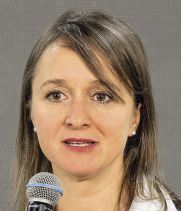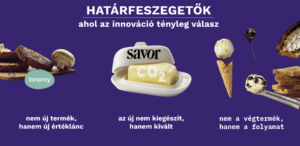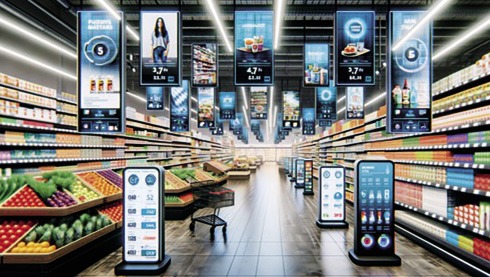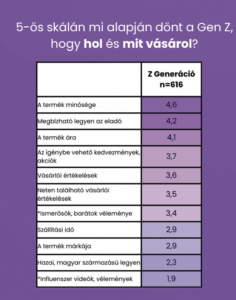The future has already begun – thoughts on Innovation Day
How will innovations shape the future of retail and the food industry? We searched for answers to this question at the Innovation Day conference held on 15 May at Lurdy Ház, which accompanied the award ceremony for Trade magazin’s Inno d’Or – Innovation of the Year 2025 competition.
This article is available for reading in Trade magazin 2025/6-7.

Zsuzsanna Hermann
managing director-editor in chief
Trade magazin
In her opening speech, Zsuzsanna Hermann, CEO and editor-in-chief of Trade magazin outlined the new framework for innovative thinking, relying on global and domestic trend data.
How a futurologist sees innovations

Dea Frankó Csuba
futurologist
Future research is now a strategic tool: a data-driven, AI-powered methodology that helps companies shape the future of the market with decisions that take into account long-term social and environmental impacts, futurologist Dea Frankó Csuba told in her opening presentation at the conference.
The essence of participatory future studies is to observe “weak signals” of change in various fields – technology, society, the environment and the economy – small but recurring patterns that can emerge into larger trends or disruptive changes.

The new member of the team is Alfred, a real AI Agent, an artificial intelligence assistant who can find solutions to problems on his own
What qualifies as new today?

Júlia Dalmadi
founder
TransFoodMission and Secontaste
In the food industry today “novelty” doesn’t just mean new flavours, packaging or technology, emphasised Júlia Dalmadi, the founder of TransFoodMission and Secontaste. True innovation can’t be found in a single product, but in the transformation of an entire value chain.
A promising area of the sustainability shift is the category of upcycled products, which reuse raw materials that were previously considered waste. The TransFoodMission and Secontaste project sold 50,000 recycled products made from 15 tonnes of discarded raw materials through Rohlik.cz.

These days, many companies prepare proteins from carbon dioxide for human consumption, following upcycling trends

Attila Kaszás
co-owner
Viwa
AI is no longer an accessory, but a business tool that accompanies everything from product innovation to international marketing, pointed out Attila Kaszás, co-owner of Viwa. The company has developed a five-step model for AI use, ranging from needs assessment to market research and segmentation to communication and follow-up.

When AI designs not only packaging, but also an entirely new product and its market launch – that’s when successful products are born
Roundtable: home-grown innovation?
In the roundtable discussion moderated by Zsuzsanna Hermann, decision-makers discussed the evaluation criteria and market realities of innovations.
Péter Gáti, purchasing team leader of PENNY believes that from a discounter perspective, true innovation isn’t about form but function.
According to Attila Tollas, SPAR’s regional procurement team leader, true innovation often lies not in a specific product, but in the ability to react quickly.
János Mezei, commercial director of Co-op Star believes innovation is only viable if it works commercially.
Petra Kovács, commercial director of REÁL Hungária told that innovation creates a competitive advantage if it isn’t only a good idea, but can also be quickly activated in line with real consumer needs.
Renáta Serfőző, own brand manager of METRO said the primary goal of innovation at METRO is to make the daily operations of HoReCa partners more efficient.

This year, for the first time, representatives of retailers were on the jury and then at the conference round table. From left to right: moderator Zsuzsanna Hermann, Attila Tollas, János Mezei, Renáta Serfőző, Péter Gáti, Petra Kovács
A mathematician’s view on innovation

Dr. László Mérő
psychologist and lecturer
at ELTE Institute of
Psychology
In the afternoon the programme began with a presentation by Dr László Mérő, mathematician, psychologist and lecturer at the Institute of Psychology of Eötvös Loránd University, who argued that all innovation involves loss: someone loses a previous advantage, market or role. However, the real losers in competition are not those who fall behind, but those who never even make it onto the playing field – for example, because they are unable to enter.
Future 100 – the defining trends of the future

Simon Illés
üzletfejlesztési igazgató
VML Hungary
VML’s international research results – conducted with 14,000 respondents in 14 countries, plus there were 60 expert interviews – are compiled in the Future 100 report, which reveals the 100 most influential consumer trends for the coming year.
Illés Simon, director of business development at VML Hungary emphasised in his presentation: global optimism is declining, with consumers simultaneously affected by climate anxiety, economic uncertainty and information overload.

Gen Z „does by no means escape from reality, but reinterprets it”

Tibor Székács
owner
Kende Retail, Avokado
The key to retail modernisation today is data-driven decision-making, underlined Tibor Székács, owner of Kende Retail and Avokado. Autonomous stores such as the AuchanGo mobile store or the Coca-Cola micro market provide access to food in office buildings, industrial sites and small towns where traditional stores aren’t available or can’t operate sustainably.

Innovation can be spotted in commercial tools, solutions and services day by day
Roundtable: will the conquest of alternatives continue?
The participants of the afternoon roundtable discussion, which was also moderated by Zsuzsanna Hermann, tried to answer the question of whether the previous wave of innovation in organic and plant-based products can be sustained in the Hungarian market.
According to Dr Beáta Olga Felkai, deputy state secretary for food chain supervision at the Ministry of Agriculture, food industry funding before 2020 was primarily used to catch up in terms of technology, but in the 2021-2027 period Hungary can focus strongly on projects that will enable us to achieve efficiency and competitiveness.
Péter Szabolcs, chairman of the Hungarian Chamber of Agriculture’s (NAK) gluten-free working group emphasised that the NAK platform brings together everyone involved in the development of gluten-, lactose-, milk protein- and sugar-free products.
Attila Vörös, executive director of the Federation of Responsible Food Manufacturers explained that the competitiveness of domestic producers is hampered by a fragmented regulatory environment and a high level of centralised bureaucracy.
István Miskolczi, president of the National Association of Plant Based Food Manufacturers and Distributors reckons that the plant-based category is growing steadily in Europe and could reach a 10% share on the German market by 2030.

A round table discussion on alternatives was also held this year. From left to right: Zsuzsanna Hermann moderator, Attila Vörös, dr. Beáta Olga Felkai, István Miskolczi, Péter Szabolcs
You have 8 seconds – don’t waste it!

Miklós László
managing director
Diverzum
Generation Z spends around HUF 1,200bn a year in Hungary, according to László Miklós, CEO of Diverzum. Their May GenZ Report used quantitative and secondary methods on an online sample of more than 8,000 people, to examine how young people over the age of 15 think about brands, shopping and values. These consumers tend to purchase experiences instead of items, but their decisions are preceded by very thorough research. They expect speed from retailers and have an attention span of only 8 seconds.

Purchase decisions of Generation Z is, surprisingly, based primarily on quality
Related news
Hungarian world first: AI calculator calculates how much a company will lose during the flu season and how much can be saved by using preventive technologies
🎧 Hallgasd a cikket: Lejátszás Szünet Folytatás Leállítás Nyelv: Auto…
Read more >EU poultry meat rules are changing: the 12-week limit for “free-range” labeling is being relaxed during a pandemic
🎧 Hallgasd a cikket: Lejátszás Szünet Folytatás Leállítás Nyelv: Auto…
Read more >Tuned to efficiency
🎧 Hallgasd a cikket: Lejátszás Szünet Folytatás Leállítás Nyelv: Auto…
Read more >Related news
A stable compass in the Hungarian FMCG sector for 20 years
🎧 Hallgasd a cikket: Lejátszás Szünet Folytatás Leállítás Nyelv: Auto…
Read more >







